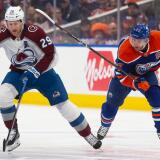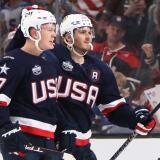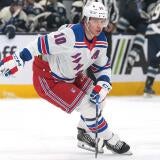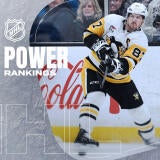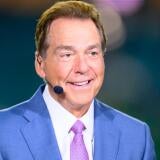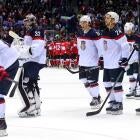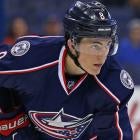
Phil Kessel and the problem with being the best player on a bad team
Phil Kessel is finding out in Toronto that when you're the best player on a bad team, you're always the guy that takes the most heat.
 |
| Players like Phil Kessel are not the reason teams like Toronto lose. (Getty Images) |
More NHL: Scores | Standings | Odds | Fight-O-Meter | League Leaders | Rumors
Being the best player on a bad team has to be a trying experience, especially when that team is one of the most scrutinized clubs in the league and in a market with a rabid fan-base and huge media presence, and is mired in one of the longest current playoff droughts in professional sports.
You're not only always losing (because your team is lousy), but because you're the best and most visible player on the team, you're the guy that is going to take the most heat for all of the problems. After all, you're probably not doing enough to make your teammates better. Or will them to victory. Or be a leader. Or hell, maybe you're just not cut out to be the top option on a good team. Maybe you need to be a secondary, support player on another team, where somebody else (somebody who is a leader, and somebody that can make his teammates better) can carry the load.
Really, the options are limitless.
That brings us to Phil Kessel and the Toronto Maple Leafs.
Kessel is the best player on the Leafs, and entering Tuesday's game against the Buffalo Sabres he has yet to score a goal in five games this season (oh no!). There a lot of ways you can look at this. Some of them are rational, some of them are not.
On one hand, there is the approach that Cam Charron took at Backhand Shelf on Monday and looked at the fact that even though he's yet to score a goal, Kessel has probably been the Leafs most dangerous player this season, has generated more shots on goal than almost any other player in the league (and by extension, has created a large number of scoring chances), and is probably due to break out once some of his puck luck changes.
(And by puck luck, that means not having potential goals taken away by random plays like this.)
Or you can take the Damien Cox approach (also from Monday) and assume that, based on a five-game sampling to start the season, Kessel is setting himself up to have his worst season in Toronto and that the Leafs should be looking to dump him for a number of reasons.
From Cox in Monday's Toronto Star:
Whatever the case, it is becoming difficult to imagine a scenario in which Kessel remains a Leaf beyond the end of this season. Part of that is, like Alex Anthopoulos with Vernon Wells, it becomes easier for the successor to exterminate the albatross than for he who attracted the burdensome seabird in the first place. Unlike Burke, Nonis doesn’t have to defend the Kessel deal. No better way to cut ties with the past and move on than to move this player. Some might suggest the same should apply to captain Dion Phaneuf, and there’s an argument to be made for that. The difference, however, is that Phaneuf was all but stolen in a trade with Calgary. Kessel cost the Leafs a great deal, as much, perhaps, in prestige as in actual assets. Indeed, that deal may ultimately have cost Burke his job. That’s not to blame Kessel for the state of the team, although as the star forward, he has to shoulder his fair share.
That is followed up with a "Kessel could be a nice secondary piece on a good team" line. Of course he could.
While the trade to acquire Kessel will always be the signature transaction of the Brian Burke era in Toronto, it's unfair to look at that one move and say it's the one that cost Burke his job. What ultimately cost Burke his job with the Maple Leafs was the simple fact the team didn't win enough games (or reach the playoffs) during his tenure.
You certainly wouldn't be wrong if you argued the long-term potential and value of that trade for Boston (two top-10 picks that landed the Bruins Tyler Seguin and Dougie Hamilton) outweighs what Toronto received in Kessel, but it's impossible to say Toronto would have been a better team the past three years and won more games (which is what Burke would have needed to save his job) had that trade not been made. Because they wouldn't have.
Beyond that, the trade is done and there is no going back and getting a mulligan on it. You can't look at what you gave up to get a player as part of the reason to eventually jettison that player, can you? How is that going to make things better? Think about the thought process to that approach. We gave up too much to get this guy, and even though he's a really good player for us, we still have to get rid of him because look at what we gave up to get him!
It's nuts. Especially when that player is not only the best one you have, but is also (and this is often times overlooked when it comes to Kessel) one of the best goal-scorers in the entire league.
But how much more is Kessel supposed to do in Toronto? What isn't he doing that he could be doing to make the Maple Leafs better? There is this idea in sports that great players make those around them better. To an extent there is some truth to that. A hockey player can improve his linemates, at least somewhat, when he's on the ice with them, and Kessel for the most part does that.
Just look at last year's Maple Leafs team and the five players who spent the most time with Kessel and how they did with him vs. without him.
(GF% = Percentage of goals scored by the team. CF% = Percentage of Corsi events -- all attempted shots -- by the team. All numbers via stats.hockeyanalysis.com)
| Maple Leafs with Phil Kessel and without him: 2011-12 season | ||||||||
| Player | Time W/Kessel | GF % | CF % | Time W/O Kessel | GF % | CF % | ||
| Tyler Bozak | 902:26 | 47.7% | 48.8% | 158:39 | 38.9% | 39.2% | ||
| Joffrey Lupul | 855:02 | 51.0% | 49.6% | 107:51 | 36.4% | 39.4% | ||
| Dion Phaneuf | 437:08 | 50.0% | 52.2% | 1046:22 | 42% | 48.6% | ||
| Jake Gardiner | 436:38 | 50.0% | 51.3% | 832:24 | 50.7% | 49.1% | ||
| John-Michael Liles | 399.49 | 53.1% | 49.0% | 700:41 | 36.5% | 49.1% | ||
So what more can he do? He (or any other player) can't will his other teammates to play better when he's not on the ice with them, and he's not going to take Toronto's revolving door of goaltending mediocrity over the years and make it passable.
Phil Kessel isn't your problem, Toronto.
I've made this point regarding Kessel and the Leafs so many times on this site that I'm beyond beating a dead horse at this point, but the problem with the Maple Leafs isn't Kessel. The problem with the Maple Leafs is they don't have more players like Phil Kessel. They don't need less of him, they need more of him (and a couple of Mikhail Grabovski and Phaneuf -- another whipping boy that takes too much blame in Toronto -- clones would help things too).
Kessel has his flaws as a player, but the idea that he is better suited to be a secondary player seems a little odd when the list of players who have scored more goals than him over the past four years consists of eight players. That list, in order, is Steven Stamkos, Alex Ovechkin, Patrick Marleau, Ilya Kovalchuk, Corey Perry, Jarome Iginla, Jeff Carter, and Rick Nash.
That's it. That's the list.
And that's a big reason why this five-game goal drought to start the season shouldn't be blown out of proportion. You have four years of consistent performance that should be enough to tell you what he's capable of and what you can expect from him by the end of the season. Even without the goals this season he has still been a threat on the ice offensively. Seasons are full of peaks and valleys not only on a team level, but an individual player level as well. There are hot streaks and there are slumps and nobody is immune to them.
This isn't the first time Kessel has gone five games without scoring a goal. It happened twice last year (when he scored a career-high 37 goals, more than all but five players in the NHL), and has happened 12 times since the start of 2008. Just for comparisons sake, just to show that nobody is immune from goal droughts, not even the best players and goal-scorers in the league, Steven Stamkos has had 15 stretches of five games without a goal since '08. Sidney Crosby has had nine. Corey Perry has had 12. It happens, even to the best of them.
I'm of the belief that no player in sports is untouchable when it comes to trade talks. Every player has a price. It's just that some players have a higher price than others. If a team makes you an offer you can't refuse and it makes your team better, you're not doing your job as a general manager if you don't take it.
But that doesn't mean you should be actively looking to dump your best player (one who is still only 25 years old) because the rest of the team, for the most part, stinks.
Guys like Phil Kessel aren't the reason teams like the Maple Leafs lose.
For more hockey news, rumors and analysis, follow @EyeOnHockey and @Agretz on Twitter and like us on Facebook. Also, subscribe to our YouTube Channel.


